-
Compression Gloves with Copper for Arthritis Rheumatoid,Relief Pain and Swelling,Osteoarthritis & Tendonitis - Copper Arthritis Gloves for Women and Men
Regular price $23.99 USDRegular price$35.99 USDSale price $23.99 USDSale -
Copper Compression Full Finger Arthritis Gloves. Copper Provides Added Protection. Best Copper Glove for Carpal Tunnel, Typing, Fit for Men & Women
Regular price $25.99 USDRegular price$35.99 USDSale price $25.99 USDSale
Collection: Discover Relief: Copper-Infused Compression Gloves for Arthritis and Carpal Tunnel
Enhance Your Comfort with Copper-Infused Compression Gloves
If you're seeking relief from arthritis, rheumatoid pain, carpal tunnel syndrome, or other hand conditions, copper-infused compression gloves may be the solution you need. These gloves are designed to support joint health, improve mobility, and reduce stiffness, making them an essential addition to your wellness toolkit.
Who Needs Copper Compression Gloves?
Copper compression gloves are beneficial for:
- Arthritis and Rheumatoid Patients: Experience reduced inflammation and pain relief.
- Carpal Tunnel Syndrome Sufferers: Gain support for the median nerve and alleviate pressure symptoms.
- Individuals with Osteoarthritis & Tendonitis: Find relief from chronic pain and swelling.
- Professionals Requiring Hand Dexterity: Ideal for those who type, sew, knit, bake, or play musical instruments, as they improve hand functionality without restricting movement.
Why Copper Compression Gloves?
These gloves are infused with copper, which provides several benefits:
- Antibacterial Properties: Copper is naturally odor-resistant and antimicrobial, keeping your hands fresh and clean.
- Enhanced Blood Circulation: The compression accelerates blood flow, reduces swelling, and alleviates joint inflammation.
- Promotes Healing: Improves oxygen supply to muscles and joints for recovery and pain relief.
How to Determine if Copper Gloves are Suitable for You
To check if copper compression gloves are right for you, assess if you have:
- Hand or wrist pain impacting daily activities
- Reduced grip strength and difficulty performing manual tasks
- Symptoms of carpal tunnel such as numbness, weakness, or a tingling sensation in your hands
Characteristics of Copper Compression Gloves
Key Features:
- Material Quality: Crafted with 100% natural copper, ensuring durability and long-lasting performance.
- Flexible Design: Available in full and fingerless versions to cater to different preferences and needs.
- Comfortable and Breathable: Designed for all-day wear without causing discomfort or sweat.
Advantages Over Traditional Gloves:
- They allow you to feel, touch, type, and grasp objects with ease.
- Provide a perfect balance between protection and flexibility.
Common Questions About Copper Compression Gloves
Do they work on both men and women?
Yes, our copper compression gloves are designed to fit both men and women comfortably, offering universal benefits.
Can they replace other types of arthritis therapies?
While they provide significant relief, it is recommended to use them in conjunction with your current treatments as part of a broader pain management strategy.
Improve Wellness with Copper Compression Gloves
By incorporating Copper Compression Full Finger Gloves into your routine, you can enhance your hand’s flexibility, strength, and overall functionality. They are the ultimate choice for anyone looking to improve hand health and reduce pain naturally.

Contact ZSZBACE for Your Wellness Needs
We, at ZSZBACE, pride ourselves on offering products backed by years of manufacturing and R&D experience. Our copper-infused gloves are made from superior materials, providing reliable after-sales service and support. Don’t let hand pain hinder your lifestyle any longer—embrace comfort and relief with our expertly crafted gloves.
Feel the difference today and explore our diverse collection to find the best fit for your needs. Your journey to pain-free living starts with us!


